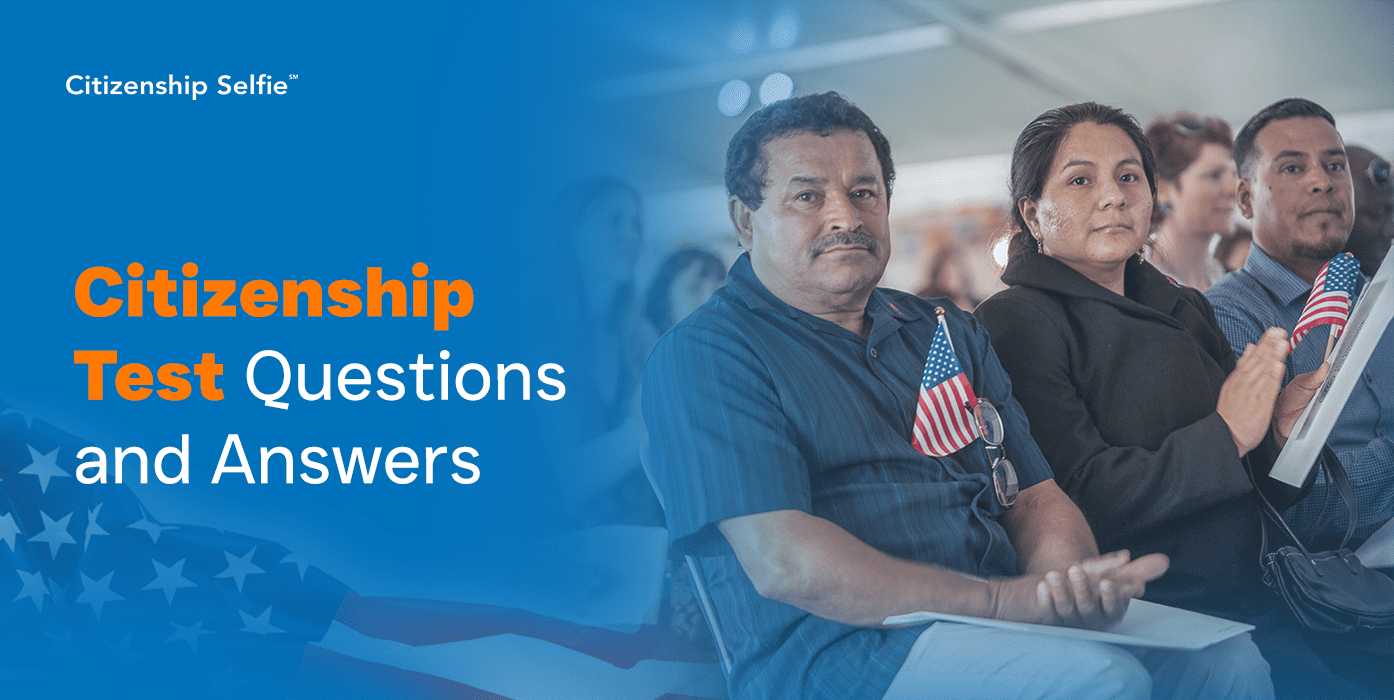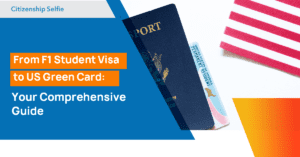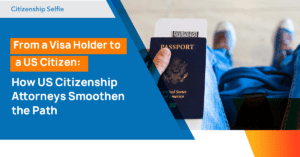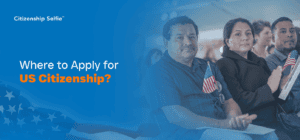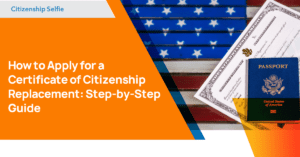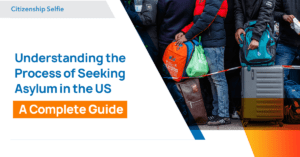US Citizenship Test Questions and Answers
What is the US citizenship test questions and answers?
Given its culture, growth, amenities, and development, many dream of becoming US citizens. The US has become a top priority for immigrating for many people around the globe. Once you have made a US citizenship application, now is the time to prepare for the US citizenship test.
Significance of Passing the Test
Clearing the citizenship test is a step in becoming a US citizen. The applicants go through the US citizenship test to know US history, government, and values. The US citizenship test determines the commitment and values to become a citizen of the US.
By taking the citizenship test, one can see what value they bring to the country and how they add value to society.
Predominantly, US citizenship is completed in two steps: the civics test, and the second step is an English language test.
The civics test examines the applicant’s awareness of US history and governance.
The English test examines the applicant’s ability to read, write, understand, and speak the English language.
The US citizenship test is conducted to ensure that the applicants know the US history, cultural values, and norms. The applicant must be aware of all these essentials before becoming a citizen of the US.
Historical Background of the US citizenship test
The test for US citizenship has a long and continuing history. The first standardized naturalization process was established by the federal government in the year 1906. This test included an assessment of US history and knowledge of government organizations. With the passage of time and the growing demand for US immigration, the format and knowledge criteria were changed.
Before establishing the standardized process in 1906, the requirements for US citizenship differed for different states. This could lead to chaos, confusion, and discrimination.
The recent US citizenship test criteria examine a better understanding of civil rights and social issues. The US citizenship test consists of civics and English language tests. The test includes 100 questions that check your understanding of US history, civil values, and administration. The applicants must answer six questions out of 10 correctly to the USCIS officer who conducts their US citizenship test. All the questions are asked verbally and have to be answered like that without any external support or help.
Contents of US Citizenship Test Questions and Answers
Civics test
The US citizenship test assesses knowledge of US government, history, and laws. The US citizenship test has 100 questions, and you need to answer six correctly out of ten random questions to pass.
The civics test covers American government, operations, and relevant departments and branches. An individual should be aware of all the democratic values and principles honored by the American government.
The History of America test comprises knowledge about the history of the US, the Revolutionary War, the cold war, the colonialization of the US, and some major events that make America great. Another essential part of the test is knowledge about the geography of the US, the essence of symbols, the rights and responsibilities of citizens, customs, and customary traditions.
English test
The importance of language in any visa process cannot be undermined since it is the language that will help you be part of a different culture. The language of the US is English, so every individual who wants to obtain US citizenship needs to qualify US citizenship test in English. The English test is designed to access an individual’s proficiency and efficiency in the English language. The applicant must hold speaking, listening, reading, and writing skills.
The English test of US citizenship test consists of the following:
Writing test: a US citizenship applicant is given dictation to write a sentence in English. The applicant is tested for writing, using proper grammar and spelling in this test.
Reading test: A US citizenship applicant is given a sentence to read out loud. The USCIS officer accesses the applicants’ ability to read and pronounce words in English in this test.
Listening test: A US citizenship applicant is tested for his ability to speak and understand English. The USCUS officer asks questions about your background, family, work history, etc., and evaluates accordingly.
The US citizenship applicants must demonstrate the ability to speak, listen, read, and write in English. The applicant has to demonstrate that he can communicate effectively in English in the US.
How to Prepare for the US Citizenship Test.
Preparing for the US citizenship test can be very tough and daunting for an individual as there is a lack of awareness and knowledge about what is included in the test and what is not. But by following a proper strategy and reliable resources, it is possible to pass the US citizenship test and become a US citizen. Here are some of the reliable resources referred to:
- The USCIS provides a list of study materials on its website, including the “Civics Test Study Guide” and the “Learn About the United States” booklet.
- You can also find other study materials such as books, videos, and online resources.
- You can refer to the study material of Citizenshipselfie; we have a uniquely designed resource collection that makes your US citizenship test journey easy.
Questions asked in US citizenship test.
- What is the supreme law of the land?
The Constitution
- What does the Constitution do?
▪ sets up the government
▪ defines the government
▪ protects basic rights of Americans
- The idea of self-government is in the first three words of the Constitution. What are these words?
▪ We the People
- What is an amendment?
▪ a change (to the Constitution)
▪ An addition (to the Constitution)
- What do we call the first ten amendments to the Constitution?
▪ the Bill of Rights
- What is one right or freedom from the First Amendment?
▪ speech
▪ religion
▪ assembly
▪ press
▪ petition the government
- How many amendments does the Constitution have?
▪ twenty-seven (27)
- What did the Declaration of Independence do?
▪ announced our independence (from Great Britain)
▪ declared our independence (from Great Britain)
▪ said that the United States is free (from Great Britain)
- What are the two rights in the Declaration of Independence?
▪ life
▪ liberty
▪ pursuit of happiness
- What is freedom of religion?
▪ You can practice any religion or not practice a religion.
- What is the economic system in the United States?
▪ capitalist economy
▪ market economy
- What is the “rule of law”?
▪ Everyone must follow the law.
▪ Leaders must obey the law.
▪ Government must obey the law.
▪ No one is above the law.
- Name one branch or part of the government.
▪ Congress
▪ legislative
▪ President
▪ executive
▪ the courts
▪ judicial
- What stops one branch of government from becoming too powerful?
▪ checks and balances
▪ separation of powers
15. Who is in charge of the executive branch?
▪ the President
- Who makes federal laws?
▪ Congress
▪ Senate and House (of Representatives)
▪ (U.S. or national) legislature
- What are the two parts of the U.S. Congress?
▪ the Senate and House (of Representatives)
- How many U.S. Senators are there?
▪ one hundred (100)
- We elect a U.S. Senator for how many years?
▪ six (6)
- Who is one of your state’s U.S. Senators now?*
- The House of Representatives has how many voting members?
▪ four hundred thirty-five (435)
- We elect a U.S. Representative for how many years?
▪ two (2)
- Name your U.S. Representative.
- Who does a U.S. Senator represent?
▪ all people of the state
- Why do some states have more Representatives than other states?
▪ (because of) the state’s population
▪ (because) they have more people
▪ (because) some states have more people
- We elect a President for how many years?
▪ four (4)
- In what month do we vote for President?*
▪ November
- What is the name of the President of the United States now?
- What is the name of the United States Vice President now?
30. If the President can no longer serve, who becomes President?
▪ The Vice President
- If the President and the Vice President can no longer serve, who becomes President?
▪ the Speaker of the House
- Who is the Commander in Chief of the military?
▪ the President
- Who signs bills to become laws?
▪ the President
- Who vetoes bills?
▪ the President
- What does the President’s Cabinet do?
▪ advises the President
- What are two Cabinet-level positions?
▪ Secretary of Agriculture
▪ Secretary of Commerce
▪ Secretary of Defense
▪ Secretary of Education
▪ Secretary of Energy
▪ Secretary of Health and Human Services
▪ Secretary of Homeland Security
▪ Secretary of Housing and Urban Development
▪ Secretary of the Interior
▪ Secretary of Labor
▪ Secretary of State
▪ Secretary of Transportation
▪ Secretary of the Treasury
▪ Secretary of Veterans Affairs
▪ Attorney General
▪ Vice President
- What does the judicial branch do?
▪ reviews laws
▪ explains laws
▪ resolves disputes (disagreements)
▪ decides if a law goes against the Constitution
- What is the highest court in the United States?
▪ the Supreme Court
- How many justices are on the Supreme Court?
- Who is the Chief Justice of the United States now?
- Under our Constitution, some powers belong to the federal government. What is one power of the federal
government?
▪ to print money
▪ to declare war
▪ to create an army
▪ to make treaties
- Under our Constitution, some powers belong to the states. What is one power of the states?
▪ provide schooling and education
▪ provide protection (police)
▪ provide safety (fire departments)
▪ give a driver’s license
▪ approve zoning and land use
- Who is the Governor of your state now?
- What is the capital of your state?
45. What are the two major political parties in the United States?*
▪ Democratic and Republican
- What is the political party of the President now?
▪ Visit uscis.gov/citizenship/testupdates for the political party of the President.
- What is the name of the Speaker of the House of Representatives now?
- There are four amendments to the Constitution about who can vote. Describe one of them.
▪ Citizens eighteen (18) and older (can vote).
▪ You don’t have to pay (a poll tax) to vote.
▪ Any citizen can vote. (Women and men can vote.)
▪ A male citizen of any race (can vote).
- What is one responsibility that is only for United States citizens?
▪ serve on a jury
▪ vote in a federal election
- Name one right only for United States citizens.
▪ vote in a federal election
▪ run for federal office
Core Civics Test
- What are the two rights of everyone living in the United States?
▪ freedom of expression
▪ freedom of speech
▪ freedom of assembly
▪ freedom to petition the government
▪ freedom of religion
▪ The right to bear arms
- What do we show loyalty to when we say the Pledge of Allegiance?
▪ the United States
▪ the flag
- What is one promise you make when you become a United States citizen?
▪ give up loyalty to other countries
▪ Defend the Constitution and laws of the United States
▪ Obey the laws of the United States
▪ Serve in the U.S. military (if needed)
▪ serve (do important work for) the nation (if needed)
▪ be loyal to the United States
- How old do citizens have to be to vote for President?
▪ eighteen (18) and older
- What are two ways that Americans can participate in their democracy?
▪ vote
▪ join a political party
▪ help with a campaign
▪ join a civic group
▪ join a community group
▪ give an elected official your opinion on an issue
▪ call Senators and Representatives
▪ publicly support or oppose an issue or policy
▪ run for office
▪ write to a newspaper
- When is the last day you can send in federal income tax forms?
▪ April 15
- When must all men register for the Selective Service?
▪ at age eighteen (18)
▪ between eighteen (18) and twenty-six (26)
- What is one reason colonists came to America?
▪ freedom
▪ political liberty
▪ religious freedom
▪ economic opportunity
▪ practice their religion
▪ escape persecution
- Who lived in America before the Europeans arrived?
▪ American Indians
▪ Native Americans
60. What group of people was taken to America and sold as enslaved people?
▪ Africans
▪ People from Africa
- Why did the colonists fight the British?
▪ because of high taxes (taxation without representation)
▪ because the British army stayed in their houses (boarding, quartering)
▪ because they didn’t have self-government
- Who wrote the Declaration of Independence?
▪ (Thomas) Jefferson
- When was the Declaration of Independence adopted?
▪ July 4, 1776
- There were 13 original states. Name three.
▪ New Hampshire
▪ Massachusetts
▪ Rhode Island
▪ Connecticut
▪ New York
▪ New Jersey
▪ Pennsylvania
▪ Delaware
▪ Maryland
▪ Virginia
▪ North Carolina
▪ South Carolina
▪ Georgia
- What happened at the Constitutional Convention?
▪ The Constitution was written.
▪ The Founding Fathers wrote the Constitution.
- When was the Constitution written?
▪ 1787
- The Federalist Papers supported the passage of the U.S. Constitution. Name one of the writers.
▪ (James) Madison
▪ (Alexander) Hamilton
▪ (John) Jay
▪ Publius
- What is one thing Benjamin Franklin is famous for?
▪ U.S. diplomat
▪ Oldest member of the Constitutional Convention
▪ First Postmaster General of the United States
▪ Writer of “Poor Richard’s Almanac”
▪ started the first free libraries
- Who is the “Father of Our Country”?
▪ (George) Washington
- Who was the first President?*
▪ (George) Washington
- What territory did the United States buy from France in 1803?
▪ The Louisiana Territory
▪ Louisiana
- Name one war fought by the United States in the 1800s.
▪ War of 1812
▪ Mexican-American War
▪ Civil War
▪ Spanish-American War
- Name the U.S. war between the North and the South.
▪ The Civil War
▪ The War between the States
- Name one problem that led to the Civil War.
▪ slavery
▪ economic reasons
▪ states’ rights
75. What was one important thing that Abraham Lincoln did?
▪ freed the enslaved people (Emancipation Proclamation)
▪ saved (or preserved) the Union
▪ Led the United States during the Civil War
- What did the Emancipation Proclamation do?
▪ freed the slaves
▪ freed slaves in the Confederacy
▪ freed slaves in the Confederate states
▪ freed slaves in most Southern states
- What did Susan B. Anthony do?
▪ fought for women’s rights
▪ fought for civil rights
- Name one war fought by the United States in the 1900s.
▪ World War I
▪ World War II
▪ Korean War
▪ Vietnam War
▪ (Persian) Gulf War
- Who was President during World War I?
▪ (Woodrow) Wilson
- Who was President during the Great Depression and World War II?
▪ (Franklin) Roosevelt
-
Who did the United States fight in World War II?
▪ Japan, Germany, and Italy
- Before he was President, Eisenhower was a general. What war was he in?
▪ World War II
- During the Cold War, what was the main concern of the United States?
▪ Communism
- What movement tried to end racial discrimination?
▪ civil rights (movement)
- What did Martin Luther King, Jr. do?
▪ fought for civil rights
▪ Worked for equality for all Americans
- What major event happened in the United States on September 11, 2001?
▪ Terrorists attacked the United States.
- Name one American Indian tribe in the United States.
▪ Cherokee
▪ Navajo
▪ Sioux
▪ Chippewa
▪ Choctaw
▪ Pueblo
▪ Apache
▪ Iroquois
▪ Creek
▪ Blackfeet
▪ Seminole
▪ Cheyenne
▪ Arawak
▪ Shawnee
▪ Mohegan
▪ Huron
▪ Oneida
▪ Lakota
▪ Crow
▪ Teton
▪ Hopi
▪ Inuit
- Name one of the two longest rivers in the United States.
▪ Missouri (River)
▪ Mississippi (River)
- What ocean is on the West Coast of the United States?
▪ Pacific (Ocean)
90. What ocean is on the East Coast of the United States?
▪ Atlantic (Ocean)
- Name one U.S. territory.
▪ Puerto Rico
▪ U.S. Virgin Islands
▪ American Samoa
▪ Northern Mariana Islands
▪ Guam
- Name one state that borders Canada.
▪ Maine
▪ New Hampshire
▪ Vermont
▪ New York
▪ Pennsylvania
▪ Ohio
▪ Michigan
▪ Minnesota
▪ North Dakota
▪ Montana
▪ Idaho
▪ Washington
▪ Alaska
- Name one state that borders Mexico.
▪ California
▪ Arizona
▪ New Mexico
▪ Texas
- What is the capital of the United States?
▪ Washington, D.C.
- Where is the Statue of Liberty?
▪ New York (Harbor)
▪ Liberty Island
- Why does the flag have 13 stripes?
▪ because there were 13 original colonies
▪ because the stripes represent the original colonies
- Why does the flag have 50 stars?
▪ because there is one star for each state
▪ because each star represents a state
▪ because there are 50 states
- What is the name of the national anthem?
▪ The Star-Spangled Banner
- When do we celebrate Independence Day?
▪ July 4
- Name two national U.S. holidays.
- New Year’s Day
- Martin Luther King, Jr. Day
- Presidents’ Day
- Memorial Day
- Independence Day
- Labour Day
- Columbus Day
- Veterans Day
- Thanksgiving
- Christmas
Who is exempted from the US citizenship test?
- 65 years old or older applicants who have been permanent US residents for at least 20 years are exempted from the English language requirement, but they are still required to take the civics test in their native language.
- Applicants who are 50 years old or older and have been permanent US residents for at least 20 years or who are 55 years old or older and have been permanent residents for at least 15 years are also exempt from the English language requirement but must take a simpler version of the civics test in their native language.
- Applicants with certain medical conditions, such as developmental or physical disabilities, may be eligible for an exemption or modification of the citizenship test requirements.
- Applicants serving or serving in the US armed forces during a designated period of conflict may be eligible for an expedited naturalization process. They may be exempt from certain citizenship test requirements.

